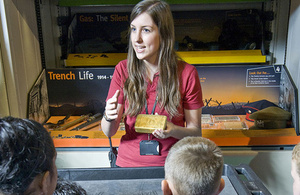How you can get involved
Discover what's happening near you to commemorate the First World War.

From learning about your local heroes to helping your community mark the centenary, there are plenty of ways you can get involved in commemorating the First World War. For even more ideas download our toolkit.
First World War Centenary Partnership
Find events happening in your local area by visiting .
Heritage Lottery Fund
Find out if you can . Grants from 拢3,000 are available to mark the centenary by exploring the heritage of the First World War, from memorials and buildings to photographs, letters and literature.
Digital postcards for you to share online
The First World War had a great influence on modern society. Find out and share how it shaped the food we eat, the way we communicate and more with these digital postcards. .
Victoria Cross commemorations, local war memorials and finding soldiers鈥� graves
Paving stones to commemorate Victoria Cross recipients
Discover Victoria Cross paving stones dedicated to heroes in your area.
Conserving and restoring your local war memorials
There鈥檚 lots of help available to make sure your local war memorial is looked after properly. Find advice and details about funding for memorials and educational materials at , and .
Recording information about war memorials
to War Memorials Archive. Photos and details about damage to the memorial help to prioritise conservation and repair work.
Listing your local war memorials
, and if not by applying to English Heritage for listed status. Listing means your memorial will be protected in the planning system and that any changes to the memorial or its setting are in keeping with its character.
Commonwealth War Graves Commission
. There are cemeteries in the UK and across the world for soldiers who died in the First World War.
Discover about life during the First World War
Home Front Legacy 1914-18 Project
, and . This wide-reaching project from English Heritage and the Council for British Archaeology will help you find out how the First World War affected people at home.
Imperial War Museums鈥� Lives of the First World War
the life stories of over 8 million men and women who participated at the home and fighting fronts during the First World War.
National Archives鈥� Centenary Programme
, as well as government documents. The National Archives is also asking for help to digitise hundreds of war diaries. Other activities include:
- Online collections
- Talks and events
- Learning opportunities
British Library World War One programme
, as well as its new learning zone. its First World War exhibition and events in summer 2014.
Arts, cultural and educational projects to commemorate the First World War
Last Post Project
. For a fortnight before and after Remembrance Sunday, people in schools, libraries, places of worship and community centres will play music, and share stories and local memories. Volunteers will play new arrangements of 鈥楾he Last Post鈥�.
14-18 NOW: centenary cultural programme
that will bring a new perspective to the commemoration.
Letter writing
. The project is inspired by Charles Jagger鈥檚 famous statue in London Paddington station of a soldier reading a letter. You are invited to write that letter. Every letter will be published online alongside contributions from 50 leading writers.
School battlefield visits
through the school battlefields programme. Two pupils from every state-funded secondary school will visit the Western Front as part of the centenary commemorations. The children will learn about local people who fought in the war and develop projects in their local area.
Getting businesses involved
Centenary Apprenticeships
. If your business has been operating for 100 years or more, it practices skills that existed a century ago and employs, or is looking to employ, apprentices, it could become a central part of the National Service鈥檚 Centenary Apprenticeship Programme.